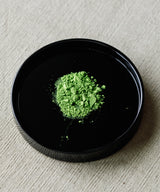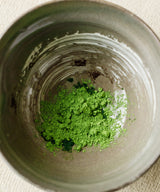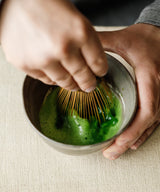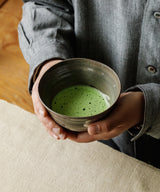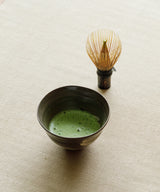Matcha "Hatsumukashi" Shincha
宇治抹茶 初昔
Origin
Uji, Kyoto
Harvest
First Harvest 2025
While this matcha is structured by a compelling bitterness, there is a smooth taste of milk coating its edges. It has a rich and luxurious mouthfeel with notes of soybean and fresh seaweed. We feel the charcoal roasting process in the soft depth of its finish.

2g ⋅ 80°C ⋅ 30ml ⋅ bamboo whisk
. . .
Arita Sansuien was founded in 1949 in Uji, Kyoto by Ippei Arita. In the 75 years since their founding, Arita Sansuien has formed deep relationships with the best tea farmers in the core producing regions of Uji. These areas – namely, Joyo City, Kyotanabe and Uji City – are some of the top regions for tencha and matcha production in all of Japan, growing the best varietals of tea trees for matcha, like Samidori, Asahi, and Ujihikari.
Arita Sansuien works with tea farmers who have been cultivating tencha for a long time, and only sources tencha that is hand picked: a labour intensive, and increasingly rare, way to harvest tea, even in Kyoto.
Nowadays, the vast majority of tea farms producing tencha shade their fields with large swaths of black vinyl cloth. However, in Uji, Kyoto there are still a few farms that practice a traditional technique for covering tea fields, passed down since the Muromachi Period. This method uses “wara,” or natural straw, and “yoshizu” (reed stem) to cover the tea plants. Although these natural coverings are very labour intensive to craft, they produce a tea of the highest quality. The natural coverings protect tea plants from the sun, while at the same allowing them to allowing air to circulate through and around them so they can breathe. Arita Sansuien always favours tea grown under these natural shades.
Also unique to their production, Arita Sansuien finishes their matcha with a drying process called “neri” that uses white charcoal, or “kishu binchotan.” This costly and tedious method for finishing matcha is rarely seen, and is a signature of Arita Sansuien’s commitment to the skillful traditional craftsmanship of matcha.
With careful control of the temperature the charcoal does not burn the delicate tencha leaves, rather, it eliminates the grassiness of the tea leaves and brings out the characteristics of each unique varietal. Matcha made this way has a natural and more gentle taste.
Arita Sansuien blends, mills, and charcoal fires all their matcha in house. They have 11 stone mills: running constantly, each mill will produce up to 40 grams of matcha per hour.

